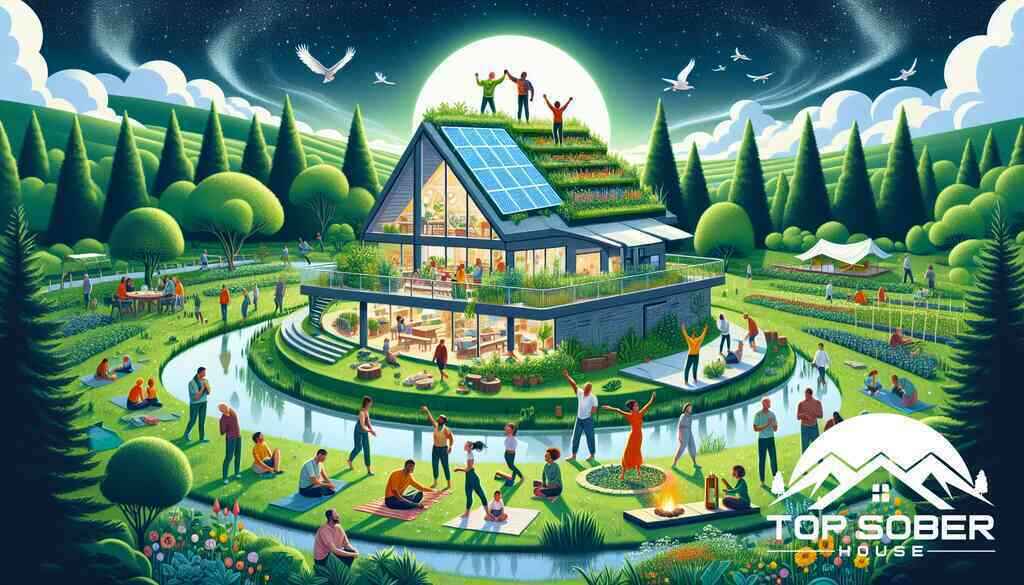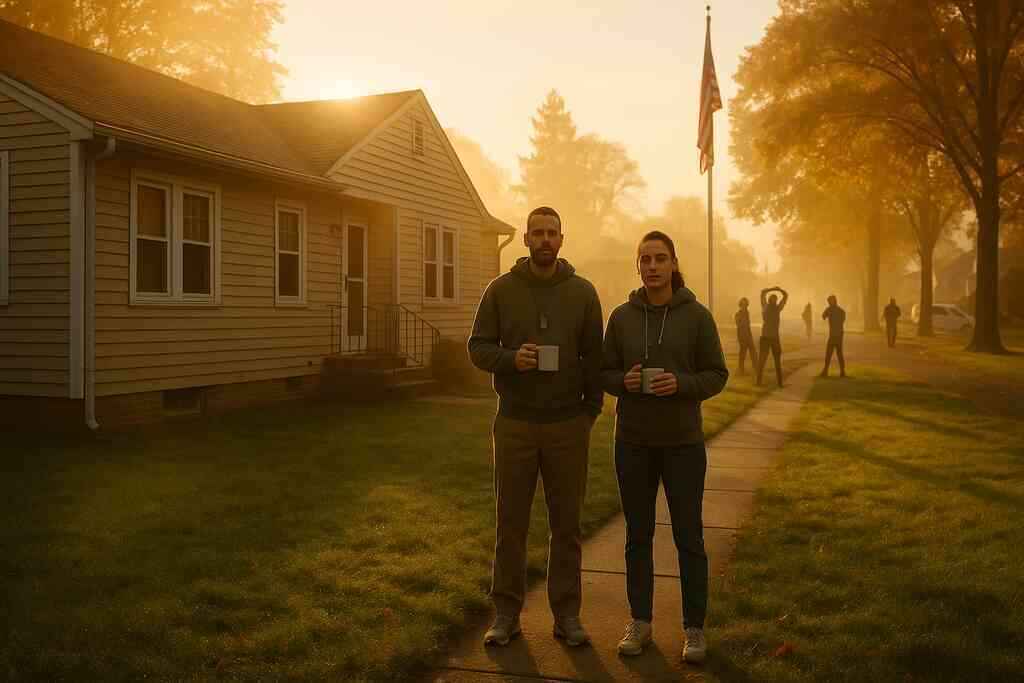
Decoding the Future of Sober Living in Top Sober Houses
September 3, 2025
Pioneering Change in Sober Living
Modern Challenges and Opportunities for Sober Living Homes
As we explore the future of sober living, understanding the modern challenges and opportunities within sober living homes is essential. Residents of sober living environments often encounter a transition period that requires careful adjustment to new norms and regulations. For many, integrating into group homes means adhering to house rules designed to foster a safe and supportive environment. Balancing personal recovery goals with the collective ethos of sober housing contributes significantly to long-term sobriety, but it can be demanding. Despite these challenges, the remarkable opportunities available in these homes offer a haven for recovery and a foundation for renewed purpose.
Adapting to Evolving Needs in Recovery Housing
Recovery housing is continuously evolving to meet the dynamic needs of individuals in early recovery. Adapting to these changes ensures that sober homes remain relevant and effective as supportive environments. The evolution of sober homes emphasizes personalized approaches that attend to the unique needs of each resident, tailoring recovery programs to fit diverse individual backgrounds and substance use histories. As the demand for more inclusive and flexible recovery solutions grows, the focus shifts to creating sustainable sober environments where residents feel empowered and engaged in their recovery voyage, offering future-proof options for robust recovery pathways.
Incorporating Technology in Sober Living Environments
Incorporating technology in sober living environments marks a transformative era for these group homes. With the advent of digital tools and tech-driven solutions, recovery now extends into the digital realm, providing residents with unprecedented access to resources and support. Virtual support groups, mobile applications for tracking progress, and digital platforms offering access to 12-step meetings are just some innovations reshaping sober living dynamics. As these technological advances integrate deeper into sober housing, they pave the way for more connected and informed residents, enhancing the overall transformative experience of sober living. Such forward-thinking advancements signal a shift towards a more adaptive and interconnected future for sober homes.
Redefining the Sober House Experience
Holistic Approaches to Recovery in Group Homes
Holistic recovery in group homes offers a comprehensive approach to sobriety, considering the multifaceted needs of residents. Sober living houses integrate various therapeutic and supportive strategies to promote balance and wellness. Residents engage in diverse activities that address the physical, mental, and emotional facets of recovery. Regular participation in mindfulness exercises, nutritional planning, and fitness routines builds a strong platform for mental clarity and resilience. Such an understanding of sobriety dynamics is vital to developing coping mechanisms that support long-term sobriety within a supportive environment.
In addition to traditional treatment programs, these sober living houses incorporate unconventional yet effective methods. Art therapy, meditation, and peer support play key roles in fostering a holistic recovery environment. Aiding this process are modern rehabilitation practices that recognize the value of addressing the whole person rather than focusing solely on substance abstinence. This integrative approach ensures that residents cultivate skills and habits conducive to sustainable recovery, establishing life-long health and wellness narratives.
Personalized Sober Housing: Tailoring the Experience
Personalization within sober housing tailors the recovery journey to the individual’s unique circumstances. Recognizing that every person has distinctive recovery needs and backgrounds, top sober houses design personalized programs that address these variabilities. This method involves assessing personal histories, substance use patterns, and specific triggers to curate bespoke recovery plans. Individualized counseling and tailor-made support systems create a nurturing environment where residents thrive.
By crafting recovery pathways unique to each individual, these sober living programs acknowledge differences in cultural, social, and psychological aspects. The use of advanced assessment tools and bespoke support mechanisms ensures that residents receive the ideal combination of therapies suited to their specific situations. This personalized approach not only optimizes the effectiveness of interventions but also builds a sense of empowerment and ownership over one’s recovery journey.
Sustainable and Progressive Sober Living Practices
Sustainability in sober living is about developing enduring recovery strategies that can withstand life’s challenges. Sustainable sober environments emphasize eco-friendly practices and self-sufficiency measures that parallel the sustainability of sobriety. Gardens within the premises provide therapeutic benefits while promoting responsibility and unity among residents. These gardens serve as a metaphor for growth, paralleling the transformative stages residents undergo during recovery.
Progressive practices in sober living include continuous adjustments and updates to ensure relevance and effectiveness. Central to this evolution is the integration of innovative solutions that address shifting societal and individual recovery needs. Programs within these homes emphasize continuous learning and adaptability, ensuring residents are well-prepared for their reentry into society. By fostering an environment of growth and learning, sober living communities lay down the foundation for ongoing recovery and personal development, set against a backdrop of enduring sustainability.

Innovations Shaping the Future of Sober Homes
Emerging Trends in Sober Living Environments
In recent years, the landscape of sober living environments has experienced a significant transformation, reflecting broader societal changes and emerging recovery methodologies. As we witness evolving sober homes in Illinois and beyond, there’s an increased emphasis on creating inclusive, supportive atmospheres. These environments are not just about abstaining from substances but fostering personal growth, community engagement, and sustainable living practices. Around the country, new trends in recovery housing are establishing themselves as integral parts of the recovery journey, demonstrating how adaptable and forward-thinking recovery solutions can be. These initiatives go beyond traditional approaches, recognizing diverse individual needs and leveraging community and environmental resources for holistic recovery support.
By exploring these top sober house models, one can observe the proactive adoption of novel recovery practices and community-centric approaches. The integration of green initiatives, peer support, and personalized recovery programs is just a few examples of how sober homes are aligning with the future’s demands. The acknowledgment of individual differences ensures that these living environments cater specifically to residents’ needs, making the journey to sobriety more manageable and successful.
Tech-Driven Solutions and Digital Tools for Recovery
The digital revolution has brought unprecedented resources and accessibility to the field of recovery, redefining how support is managed and delivered. Today, tech-driven sober houses are using cutting-edge applications to facilitate communication, offer support services, and monitor recovery progress remotely. For instance, mobile apps and online platforms provide real-time access to support groups and professional guidance, making recovery tools readily available to residents. Innovations in sober living in Ohio are leading the way in integrating such technologies, showcasing how digital solutions foster efficient and effective recovery management.
Alongside these advancements, advancements like virtual reality therapy and AI-driven analytics are starting to make their mark. Virtual reality therapy and AI-driven analytics present personalized interaction opportunities, enabling residents to practice and apply coping strategies in simulated environments. These technologies present personalized interaction opportunities, enabling residents to practice and apply coping strategies in simulated environments. This not only enhances engagement but also reduces instances of relapse by preparing residents for real-world scenarios. By embracing such technological innovations, sober living facilities are positioning themselves as leaders in the next generation of rehabilitation-a monumental shift toward sustainable, tech-savvy recovery models.
Creating Safe and Adaptive Recovery Communities
The future of sober living is inherently connected to the concept of creating safe and adaptive recovery communities. Safety in sober homes extends beyond physical space; it encompasses emotional, social, and mental well-being. Adaptive recovery pathways are formulated to address individual needs and challenges residents might face during recovery. This holistic approach ensures that sober living environments are not static but instead evolve in response to new research, societal norms, and individual resident dynamics.
Furthermore, these recovery communities effectively build resilience and solidarity among residents. Programs often integrate supportive peer networks that can act as lifelines during challenging times, while also nurturing camaraderie and shared goals. By embracing transformation and continuous improvement, sober living environments are setting a paradigm for supportive, responsive recovery models. As we look to the future, these communities will likely continue to evolve, offering dynamic support structures that cater to an ever-changing landscape of sober living needs.
A Visionary Path Ahead for Sober Living
Future-Proofing Sober Houses for Long-Term Sobriety
The future of sober living environments leans heavily on ensuring that sober houses are fortified to support long-term sobriety. A key facet of this approach involves integrating adaptive designs that accommodate evolving recovery needs while remaining resilient to societal changes. These homes adopt strategies that ensure residents receive continuous emotional and psychological support, crucial for maintaining a steadfast recovery journey. By proactively adopting frameworks that encourage a sustainable sober lifestyle, these environments pave the way for enduring alcohol abuse recovery, thereby future-proofing sober houses for long-term sobriety.
Education and continuous learning play pivotal roles in this transformation. Recovery programs focus on equipping residents with the skills and knowledge necessary to navigate potential challenges in their sobriety path. This educational focus prepares individuals to handle life’s unpredictabilities while maintaining their sober commitment. By laying down robust foundations of knowledge and skill development, sober homes empower residents, fostering an informed recovery environment that champions long-term sobriety.
Implementing Innovative Supportive Environments
Implementing innovative supportive environments in sober living is indispensable for catalyzing meaningful recovery experiences. These environments leverage an array of methodologies encompassing both traditional practices and groundbreaking technology. For example, incorporating virtual reality simulations helps residents practice coping mechanisms in a safe, controlled space, bridging theoretical understanding and practical application. Meanwhile, modern sober environments remain attentive to nurturing peer networks, which serve as a bedrock for communal support, offering a scaffold upon which residents can rebuild their lives.
In addition to tech integration, sober living houses are progressively adopting holistic approaches that regard emotional and mental wellness as equal pillars of recovery. This comprehensive consideration melds traditional support mechanisms like support groups with modern therapeutic modalities found in mental health centers for sober living, ensuring residents experience a balanced recovery approach. These integrated environments cultivate an atmosphere conducive to healing, reflecting a commitment to pioneering innovative support solutions that accommodate the complex tapestry of recovery needs.
Next-Gen Sober Communities: What’s on the Horizon?
With a keen eye on emerging trends, next-gen sober communities are poised to redefine the recovery landscape. These visionary communities prioritize inclusivity and individualized approaches, ensuring all residents receive tailored care that resonates with their unique recovery narrative. As we look forward, these communities will focus on enhancing dynamic support structures, integrating cutting-edge technologies, and embracing sustainable living practices to offer a comprehensive recovery framework.
Upcoming innovations suggest a shift toward more decentralized, community-based sober environments that allow individuals to access support within their familiar surroundings. Ultimate Guide to Sober Living Environments in the US highlights the importance of reducing barriers to access and facilitating a broader outreach. These structures reduce barriers to access and facilitate a broader outreach, highlighting how trends in sober living are shifting toward inclusive models. As recovery pathways are transformed, the ongoing commitment to identifying and dismantling obstacles ensures that next-gen sober communities remain at the forefront of adaptive recovery models.
Ultimately, the horizon for sober living is one of continual growth and innovation. By harnessing the principles of resilience, education, and community-centric recovery models, these revolutionary homes stand poised to provide sustainable, supportive, and forward-thinking foundations for individuals embarking on their sobriety journey.
Frequently Asked Questions
Question: How does Top Sober House incorporate technology in its sober living environments?
Answer: Top Sober House embraces tech-driven solutions to enhance the recovery journey of its residents. Our digital platforms provide residents with access to virtual support groups, mobile applications for tracking progress, and online portals to attend 12-step meetings. These advancements ensure that individuals have constant access to valuable resources and a supportive network at their fingertips. By integrating cutting-edge sober houses with modern technology, Top Sober House stands at the forefront of innovations in sober living, creating a connected and informed recovery environment.
Question: In what ways are the sober living houses under Top Sober House personalized to fit individual recovery needs?
Answer: Top Sober House is dedicated to providing personalized sober housing by tailoring recovery programs to each resident’s unique needs and backgrounds. We assess personal histories, substance use patterns, and specific triggers to develop bespoke recovery plans that foster empowerment and ownership over one’s recovery journey. By recognizing the diversity of our residents, our top sober homes design individualized counseling and support systems that enhance the effectiveness of interventions, ensuring a nurturing and supportive environment for sustainable recovery.
Question: What trends in sober living can be observed in Top Sober House environments?
Answer: At Top Sober House, we are constantly evolving our sober living programs to align with emerging sober living practices. Our recovery housing evolution focuses on creating inclusive and supportive environments by integrating green initiatives, peer support networks, and sustainable sober environments. These trends emphasize personal growth, community engagement, and the adoption of modern sober environments, ensuring our residents experience comprehensive and dynamic recovery support. By staying ahead of the curve, Top Sober House demonstrates its commitment to innovative recovery communities.
Question: How does Top Sober House ensure the future-proofing of its sober living houses for long-term sobriety?
Answer: Top Sober House is focused on future-proofing sober houses to support long-term sobriety by integrating adaptive designs and sustainable practices that accommodate evolving recovery needs. We emphasize continuous emotional and psychological support, alongside a strong educational framework, to prepare residents for the unpredictabilities of life. Our recovery programs equip individuals with the necessary skills and knowledge to navigate challenges, fostering an informed and resilient recovery journey that champions long-term sobriety.
Question: How does the blog ‘Decoding the Future of Sober Living in Top Sober Houses’ reflect the progressive practices at Top Sober House?
Answer: The blog, ‘Decoding the Future of Sober Living in Top Sober Houses,’ highlights the innovative and progressive practices implemented at Top Sober House to enhance sober living environments. By detailing the incorporation of technology, holistic recovery settings, and personalized sober housing, the blog showcases our commitment to shaping the future of sober living. As a visionary in recovery pathways, Top Sober House is dedicated to meeting the dynamic needs of residents, ensuring sustainable and supportive environments that align with the future sobriety solutions and trends in sober living. What Defines a Safe Environment at Top Sober House



